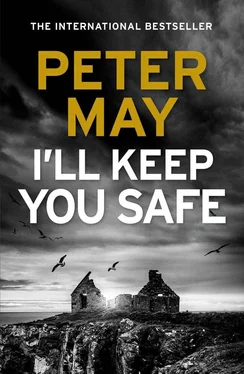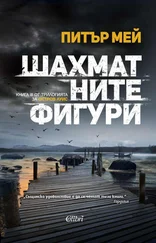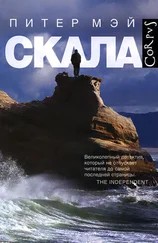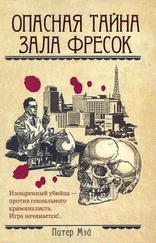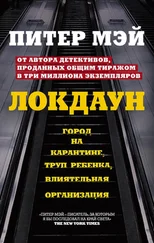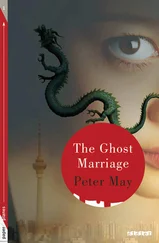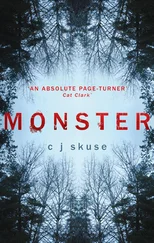Niamh and Steiner lounged in soft chairs looking out at the Minch, sunlight playing in burned-out patches on the water, dazzling briefly before vanishing to appear somewhere else, like spotlights shining through breaks in the cloud. Successive headlands to the south faded in silhouette into the mist of rain and late afternoon sun.
Steiner was on to his second whisky soda, and Niamh was troubled. She said, ‘You don’t really think that the mafia would have killed Ruairidh in revenge for telling that story in a newspaper?’
Steiner shrugged and sipped thoughtfully on his whisky. ‘The truth of it is, the thing that happened with Capaldi and his guys... it was just one of life’s little brain-fuckers. Comes out of the blue, and you can’t quite believe what it is you’ve just witnessed. I mean, hell, it happened so fast I never even had time to shit myself.’ He grinned, then the smile slowly faded. ‘But damnit, Niamh, it’s the kind of story you tell in smoke-filled rooms with old friends or trusted customers when you’ve had a drink or three. It just ain’t something you brag about in the national media. Know what I mean? Even though it was a long time ago. Jees, someone out there might just have thought that Ruairidh was trying to profit from it. And you don’t tell tales about the mafia for commercial gain. These guys have got long memories and hold grudges for even longer.’
It was something that would never have occurred to Niamh. And it was disconcerting. ‘That would seem like a lot of trouble to go to for very little.’
‘What you and I think of as very little, Niamh, ain’t always seen that way by others. And it’s classic mob MO. Bombs and cars.’ He finished his drink and stood up. ‘But who the hell knows? If it was them ain’t nobody ever gonna tell.’
He crossed to lay his glass on the breakfast bar and collect his coat and hat.
‘I better go. Get myself checked in.’
Niamh crossed the room to help him on with his coat and give him a hug. ‘Take care on the road. I know you’re not used to driving on the left.’
He shook his head. ‘Gotta think it through at every junction. Crazy thing you Brits do, driving on the wrong side of the road.’ He kissed her cheek. ‘I’ll see you tomorrow, at the funeral. I guess someone at the hotel can point me in the right direction.’
She nodded and stood by the open door to watch him turn the Shogun and lurch off up the track towards Bilascleiter. This brief moment of animation and unexpected laughter, memories shared with an old friend, had passed too quickly and left her feeling bereft and lonely again. In her heart she didn’t really believe that the mafia had anything to do with Ruairidh’s death. That was just Jacob Steiner being dramatic. After all, why would the mob have sent her and Ruairidh emails? What did they know of, or care about, Irina Vetrov?
She looked at her waterproof jacket hanging on the rack by the door, mud-caked wellies on the floor beneath it, and decided she would rather walk out along the cliffs in the hope of a good strong wind to blow away her mood, than sit festering in an empty house.
Braque came down the carpeted staircase from her room and found Gunn sitting at the bar in the lounge where she had left him. He was nursing the same pint, and she thought that probably alcohol was another item on the banned list that the doctor had given to his wife.
‘Sorry about that,’ she said. Condensation from her glass of Chardonnay lay in a pool around the bottom of it, and the wine had lost its chill.
Gunn glanced at her and said, ‘What’s wrong?’
She darted a quick look in his direction. She was, it seemed, an open book to everyone but herself. ‘It’s that obvious?’
‘I’ve been interviewing folk for nearly thirty years, Ma’am. I think I know when something’s amiss.’
She shrugged helplessly. Confiding in others was a habit she had lost in these last years. But maybe it would be easier with a stranger, and certainly after a glass or two of wine. ‘Do you have children, Monsieur Gunn?’ And she immediately saw disappointment in the set of his mouth.
‘Afraid not, Ma’am. Something we were never blessed with.’
She shrugged, toying with her fingers on the bar in front of her. ‘They can be a blessing. And a curse.’ She glanced across at him. ‘No doubt your wife would have stayed at home and looked after them.’
‘Probably.’
‘But, you see, I couldn’t stay home. I had a job. And not the kind of nine-to-five job my husband had. It was a job that could call on me at any time, keep me out half the night, make me give up my days off. And Gilles was the one who ended up looking after the girls.’ She paused to clarify. ‘Twins.’
‘Gilles? That’s your husband?’
‘Was,’ she corrected him. ‘We split up a couple of years ago. He found someone else. After we broke up, he claims. But I figure it started long before.’ She glanced at him again and saw his discomfort. This was personal, not professional. But it felt good just to talk. She drained her glass and waved at the barman to refill it. ‘I got custody, but the truth is that they spend more time with him than me. I just can’t seem to be a mother and a police officer at the same time. And do you know what day care costs?’
Gunn didn’t.
‘Much more than I can afford. So Gilles takes them. All the time. And now he wants to revisit the custody agreement.’
‘Would that not be for the best?’
She gazed gloomily into her glass. ‘For the girls, maybe. Not for me. I can’t bear the thought of my babies looking on someone else as maman . Which is what would happen.’ She took several swallows of wine. ‘I’m just off the phone to Gilles. Been trying to get him for two days. It turns out that Claire is not well.’
‘That’s one of the twins?’
She nodded. ‘She’s got a fever of some kind, and he’s had to call the doctor.’ She turned imploring eyes on Gunn. ‘I should be there.’
‘Aye, Ma’am, you probably should.’
‘But I’m here.’
‘Aye, Ma’am, you are.’ Gunn pursed his lips and drew a long slow breath through his nostrils. ‘But you know, sometimes you just have to make choices. It wouldn’t make any difference to Ruairidh Macfarlane if you were to go home now. He’ll still be dead. And as for whoever killed him, they’ll just put someone else on that.’
‘Yes, and I’d probably lose my job.’
Gunn shrugged. ‘Choices again, Ma’am.’ And she heard the echo of Madeleine’s voice in his. He sipped on his beer, but he was still less than halfway through it. ‘When I had my heart attack in March, there was a time I thought I wouldn’t see the year out. There’s nothing quite like death, or the threat of it, to bring home to you just how precious and precarious life really is. It made me think about what was most important to me, about where my priorities should lie. With my wife or my job.’ He scratched his head. ‘I know it’s different for me. Being a policeman in Stornoway is quite another thing from being a policeman in Paris. And I was lucky, I was able to keep both. But, believe you me, if I’d had to choose between this —’ he took out his warrant card and slapped it on the bar — ‘and my good lady... being any kind of a policeman would have come a very distant second. Because in the end, people matter more than jobs. Your heart is more important than your pay packet.’
Braque looked at him with something like envy. How wonderful, she thought, to have such a clear vision of life. To cut through all the fog and obfuscation to make unequivocal choices. Maybe only proximity to death can force such focus. She said, ‘I’ll go home after the funeral. Day after tomorrow.’
Читать дальше
